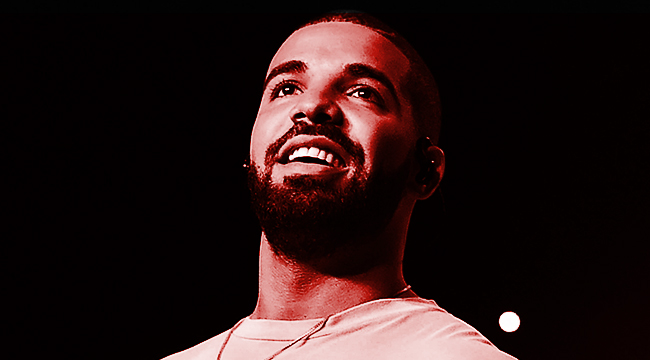
Drake finally grows up on his latest album, Scorpion… a little.
Over the years, the primary topics of Drake’s prolific pen have remained admirably consistent: Dramatic reproductions of his romantic relationships exaggerated for maximum pathos and his moody interpretations of the ups and downs of fame. For the past decade, that’s been enough to make him one of the most recognizable stars in hip-hop and in pop culture, despite muted grumblings from hip-hop’s growing cadre of disgruntled, underground fans online that he has been “too soft,” that he “sings too much,” that he’s disingenuous when it comes to old-fashioned hip-hop boba fides. He only raps about — or sings about — the same things over and over again, so the complaint goes, never mind that these same detractors usually hand out passes left and right to Drake’s contemporaries and forebears for doing the exact same thing.
If anything, Drake has played the traditional rapper role remarkably straight; after all, Drake’s primary influences like Jay-Z, Nas, and Kanye didn’t begin adopting “grown man rap” personas until well into their thirties. Jay’s most mature album to date, 4:44, was released well after his 47th birthday, while his first brushes with so-called “dad rap” weren’t truly incorporated into his repertoire until his 2011 joint album with Kanye, Watch The Throne, delivered a full decade after Nas needled Jay about his age during their iconic battle. That Drake is now 31 years old, only recently became a dad himself, and has only just begun to add this new dimension to his music is right in line with everything that has gone before.
Of course, on the supersized double album Scorpion, that newfound source of inspiration comes nestled within a now typical latter-day Drake album. Drake clearly heard the complaints, the album landed complete with an “editor’s note” that ran them down in detail. However, for all the moments of creative growth and the efforts to disprove or overcome each of his detractors’ critiques, Scorpion still comes with all the hallmarks that prompted them to begin with. He still milks his interior monologue with regards to women scorned for an uncomfortable portion of Scorpion’s sizable runtime, he still has an unfortunate penchant for style over substance and quantity over quality, stuffing much of the album with redundant filler. The difference is that, at long last, he’s begun to show true signs of maturity.
Drake has plenty of real life material to address this time around, from the confirmed rumors of a secret child with a former video vixen to his feud with Pusha T, and he does so with all the passive aggressive tenacity we’ve come to expect from The Boy. On the album intro, “Survival,” he delves straight into the latter, rhyming, “Seen this movie a hundred times, I know where it’s headed / Realize someone gotta die when no one’ll dead it / N——s gamblin’ with they life for some content / That’s the type of lottery that could get your top picked.” His complicated relationship with his son’s mother is never fully addressed on the album in full, but permeates both sides of the album, prickling on single “I’m Upset,” and on “Emotionless,” a Mariah Carey-sampling rumination on his discomfort with the trappings of fame, and the album closer “March 14” which grapples with his emerging dilemma as a “co-parent.”
Prior to the album’s release, rumors held that the two sides would each indulge Drake’s opposing proclivities for rapping and singing; for the most part, that turns out to be true. The vast majority of “Side A” contains Drake’s deadpan contemplation of fame with dextrous lyricism over production from the likes of DJ Premier, fixing it squarely in the tradition of his more boastful and world-weary moments like “Lord Knows,” “Weston Road Flows,” and his “AM/PM” series, while the second side traffics primarily in his romantic regrets (on “Jaded,” “Finesse,” and “Blue Tint”), celebratory anthems for the most loyal portion of his fanbase (“Ratchet Happy Birthday,” “Nice For What”), and his growing paranoia of scheming women (“That’s How You Feel”). Unfortunately for those hoping for a little more nuance in Drake’s musical treatment of the fairer sex, his newfound level of introspective depth still seems to find him skirting his own complicity in his relationship predicaments, rendering his would-be thoughtful missives somewhat shallow, despite the sonic innovation on tracks like “In My Feelings,” where producers 40, TrapMoneyBenny, and BlaqNMild give a huge signal boost to up-and-coming Miami rap duo City Girls with a surprise appearance on the hook.
The crowning achievement of the album is its heart-wrenching closer, “March 14,” the most sincere moment of its 25-song tracklist and possibly of Drake’s entire career. Here Drake is almost ruthless in his methodical analysis of his hang-ups about parenthood and family, while at the same time, the most hopeful he’s sounded since “Successful” as he pens a confessional, heartfelt letter to his infant son. It’s such a poignant moment that, for reasons of my own, I found it almost difficult to listen to. Ironically, if there were more of such moments, Scorpion as a whole would be easier to listen to. Sadly, the excessive tracklist drags it down as with Drake’s prior efforts Views and More Life. Drake seems so preoccupied with proving he can do a little of everything, that he can please everybody, that he never stops to consider how each song contributes to a cohesive artistic statement. Still, there are worse ways to spend two and half hours than consuming Drake’s latest offering. The end result is the same: Drake will remain one of the most polarizing, compelling, and fascinating character studies in hip-hop, but if he keeps finding new dimensions as he does here, he’ll age, but never truly get old.
Scorpion is out now via OVO Sound and Young Money Records. Get it here.






